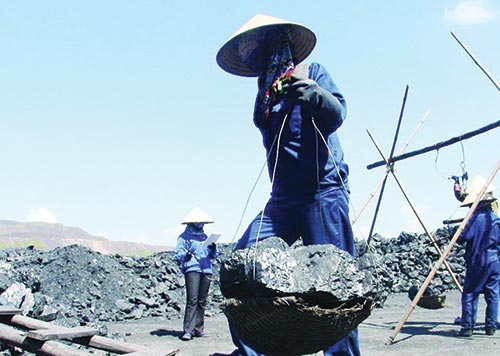Vietnam encouraged to adopt carbon pricing, energy taxes

Professor Hallding has recommended Vietnam develop post-fossil fuel plans
Professor Karl Hallding, senior research fellow at the Stockholm Environment Institute, said Vietnam should develop comprehensive plans to phase out fossil fuel and agricultural input subsidies.
Hallding, co-author of the Global Commission on the Economy and Climate’s Better Growth, Better Climate: the new Climate Economy report, which was released last month, recommended that Vietnam introduce a strong, predictable and rising carbon price as part of its fiscal reform strategy. He called for prioritising the use of revenue from this source to offset the impact on low-income households and to finance a reduction in subsidies.
The report also suggested that if countries like Vietnam were serious about climate change, they would have to eliminate fossil fuel and agricultural subsidies, making carbon dioxide (CO2) emissions more expensive.
Hallding said Vietnam had the opportunity to build lasting economic growth while simultaneously reducing the immense risk of climate change.
“But action is needed now,” he stressed.
According to the report, high-carbon growth is proving increasingly costly. In the 15 countries with the highest greenhouse gas emissions, the damage to health from poor air quality is valued at an average of over 4 per cent of GDP. In China, this figure is as high as 10 per cent.
Electricity prices are currently capped and vary for different users in Vietnam. Domestic coal prices are set below world market prices to enable cheap electricity production. There are also price ceilings in the refined petroleum markets.
New Zealand Ambassador to Vietnam Haike Manning has also called for Vietnam’s fossil fuel subsidy policy to be reformed.
“Subsidy reform is important to encourage international and domestic private sector investment in the energy sector, and to level the playing field by encouraging development of alternative energy generation, including renewables. By reducing the incentives to burn coal, this will assist Vietnam in managing its greenhouse gas emissions,” he said.
Swedish Ambassador to Vietnam Camilla Mellander said Sweden could offer solutions to Vietnam as it struggled with rapid urbanisation, increasing waste volumes, and air pollution.
“It is inspiring to learn how new technologies and innovations can be used to transform waste into biogas, houses can be designed to produce energy instead of consuming it, and transport systems can be designed to serve private and public interests efficiently,” she said.
Over the past 40 years, Sweden has halved its emissions while doubling its GDP. Since 1990, it has slashed CO2 emissions by 20 per cent, while GDP has risen by 60 per cent.
This achievement is due to Sweden’s introduction of fiscal instruments such as carbon and energy taxes. The polluter pays the principle, and setting the right economic incentives by pricing CO2 is a solid foundation for Sweden’s climate policy.
“Our industry is energy-efficient and competitive, and tax revenues from our CO2 tax has been much welcomed to strengthen our public finance. It can also be used to achieve social goals and lower taxes on labour,” Mellander said.
A recent World Bank report shows that about 40 countries and over 20 sub-national jurisdictions now apply or have scheduled to apply carbon pricing through a carbon tax or emissions trading scheme. A further 26 countries or jurisdictions are considering carbon pricing. Together these schemes cover around 12 per cent of global emissions.
What the stars mean:
★ Poor ★ ★ Promising ★★★ Good ★★★★ Very good ★★★★★ Exceptional
Latest News
More News
- Going green to save a bundle (June 08, 2015 | 10:00)
- Green buildings: the rising trend (June 02, 2015 | 09:41)
- Green buildings – key to sustainable urban development in Vietnam (May 18, 2015 | 17:00)
- Feed-in tariffs continue to haunt green energy prospects (December 15, 2014 | 10:47)
- Building material types intrinsic to green ratings (December 09, 2014 | 11:56)
- Turning an eco- smart dream into reality (December 09, 2014 | 11:55)
- Green products enjoy a growing presence at Vietbuild Hanoi 2014 (December 01, 2014 | 10:06)
- Country profits from green building (November 24, 2014 | 11:02)
- Firms flout enviroment laws (November 17, 2014 | 10:48)
- Energy efficient sticks and carrots (November 10, 2014 | 15:30)
















 Mobile Version
Mobile Version